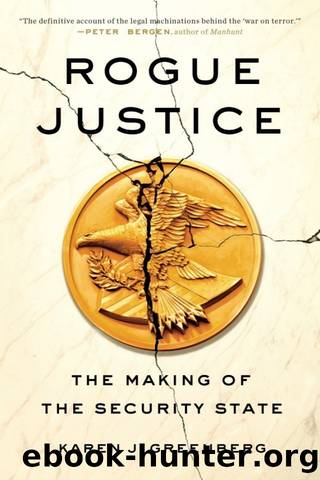Rogue Justice: The Making of the Security State by Karen J. Greenberg

Author:Karen J. Greenberg [Greenberg, Karen J.]
Language: eng
Format: epub, azw3, mobi
ISBN: 9780804138239
Amazon: 0804138230
Publisher: Broadway Books
Published: 2017-05-22T23:00:00+00:00
The most unusual thing about the case argued in federal court in Providence, Rhode Island, on June 19, 2008, was not that the court convening it, the FISA Court of Review, had met only once before in its thirty-year history. It wasnât the way technicians had swept the room for bugs and cut it off from the Internet, turning Courtroom 3 temporarily into a Sensitive Compartmented Information Facility (SCIF). It wasnât the briefcases full of classified information that the three Justice Department lawyers had physically held on to for the hours-long trip from Washington, or even the intrigue surrounding their journey, which had led at least one of them to lie to his wife about his destination that day. And it certainly wasnât the argument itself, in which a government lawyer once again asserted that the war on terror could not be fought without restricting Fourth Amendment rights, while his opponent countered that to take away civil liberties in the name of national security was to compromise the very principles for which the war on terror was being waged.
No, the strangest thing was that the lawyer worrying over constitutional rights, Marc Zwillinger, was not from the ACLU or the Center for Constitutional Rights; nor was he representing detainees or tortured prisoners. Instead, he represented a large American corporation: the Internet company Yahoo! The issue at hand was a government order forcing Yahoo! to âassist in warrantless surveillance of certain customersâ by turning over records of their communications. Yahoo! had so far failed to comply with this order, a defiance that was about to cost the company $250,000 a day in fines. But Zwillingerâs argument in court that day wasnât about the cost or difficulty of supplying the government information about the private communications that passed through its servers in California. And it was only a little bit about the consequences to its bottom line should its customers discover the breach. Mostly Yahoo!âs objection rose above petty corporate interests and invoked the basic principles of American jurisprudence. The government, Zwillinger told the three-judge panel, was compelling his company âto participate in surveillance that we believe violates the Constitution of the United States.â It was refusing to supply the data on principle. It was evidently one thing for a corporation to amass huge amounts of data on its customers to sell to other corporationsâwhich was, after all, Yahoo!âs business modelâand another for that company to be required to provide its information to intelligence agencies.
The Yahoo! case got on the FISCR docket only after the FISA Court itself ruled that Yahoo! had to comply with the order. The judge in that case, Reggie Walton, was not necessarily a friend to the Bush administration. He was best known for denying bail to Vice President Dick Cheneyâs chief of staff Scooter Libby pending appeal of his conviction for revealing the identity of CIA agent Valerie Plame. Even so, Walton upheld the governmentâs directives, largely with the same reasoningâstraight from John Yooâs infamous memosâthat had led
Download
Rogue Justice: The Making of the Security State by Karen J. Greenberg.azw3
Rogue Justice: The Making of the Security State by Karen J. Greenberg.mobi
This site does not store any files on its server. We only index and link to content provided by other sites. Please contact the content providers to delete copyright contents if any and email us, we'll remove relevant links or contents immediately.
The Secret History by Donna Tartt(16675)
The Social Justice Warrior Handbook by Lisa De Pasquale(11495)
Thirteen Reasons Why by Jay Asher(7806)
This Is How You Lose Her by Junot Diaz(5802)
Weapons of Math Destruction by Cathy O'Neil(5053)
Zero to One by Peter Thiel(4840)
The Myth of the Strong Leader by Archie Brown(4796)
Promise Me, Dad by Joe Biden(4459)
Beartown by Fredrik Backman(4438)
Stone's Rules by Roger Stone(4426)
How Democracies Die by Steven Levitsky & Daniel Ziblatt(4425)
The Fire Next Time by James Baldwin(4354)
100 Deadly Skills by Clint Emerson(4090)
A Higher Loyalty: Truth, Lies, and Leadership by James Comey(4044)
Rise and Kill First by Ronen Bergman(4026)
The David Icke Guide to the Global Conspiracy (and how to end it) by David Icke(3899)
The Farm by Tom Rob Smith(3882)
Secrecy World by Jake Bernstein(3792)
The Doomsday Machine by Daniel Ellsberg(3742)
